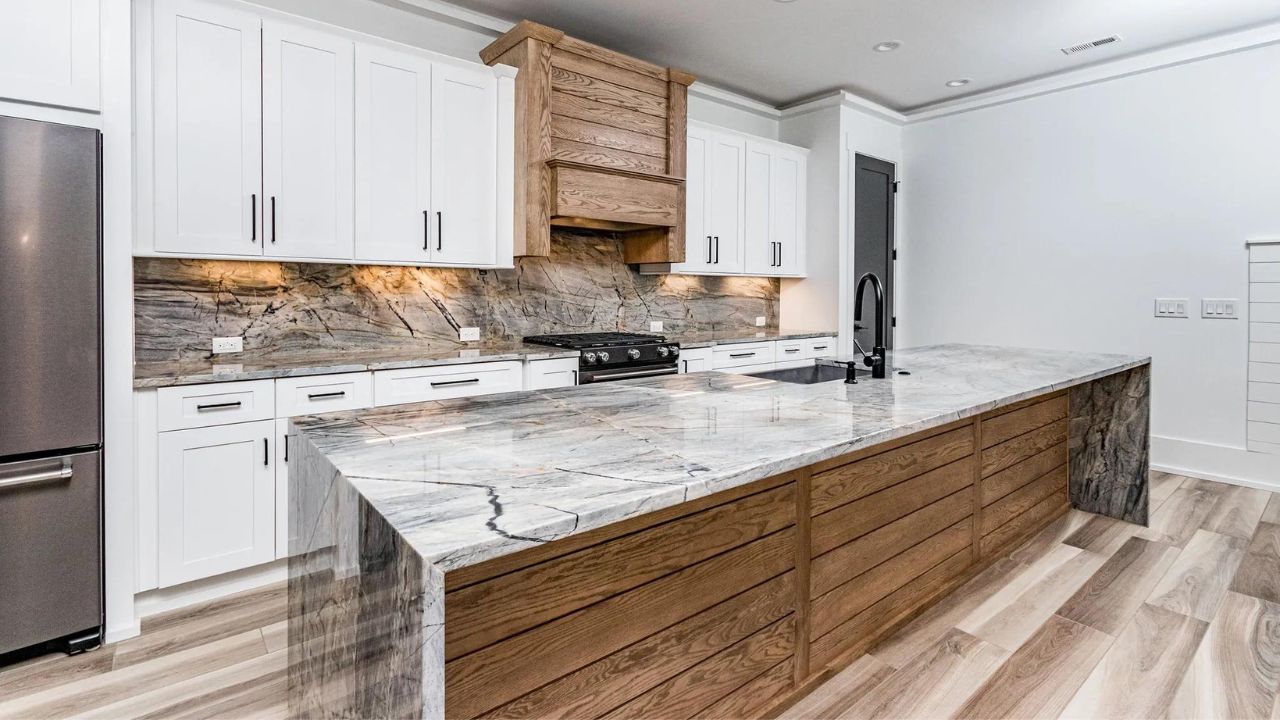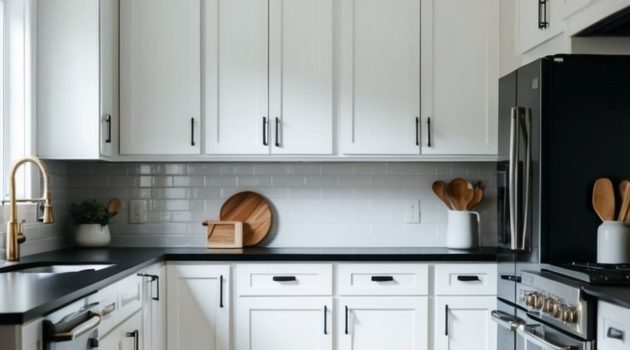Are you considering updating your kitchen or bathroom countertops? If so, quartzite countertops might be on your radar.
Quartzite is a beautiful, durable natural stone option that offers a unique appearance and a variety of benefits for your home.
In this article, we will explore the pros and cons of quartzite countertops so you can decide whether they’re the right choice for you.
1. Understanding Quartzite Countertops
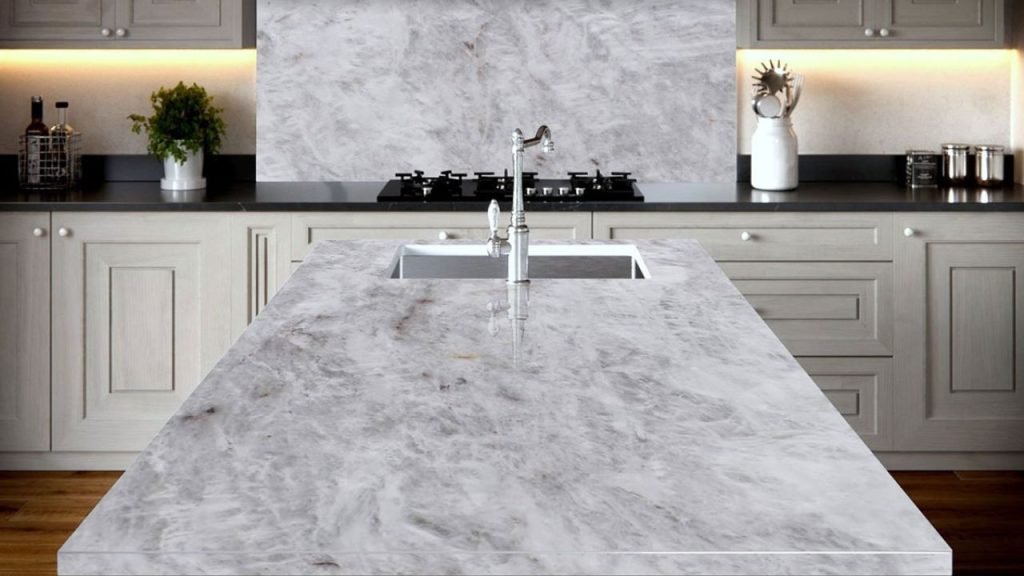
Defining Quartzite
Quartzite is a natural stone formed from sandstone under intense heat and pressure, transforming it into a durable, high-quality metamorphic rock.
This versatile material offers homeowners an elegant, sturdy option when selecting a surface for their kitchen or bathroom countertops.
Natural Stone vs Engineered Stone
When comparing materials, it is essential to understand the differences between natural and engineered stone.
Quartzite is considered a natural stone, which means it is dug out of the earth in large blocks and then cut and polished into slabs for countertops.
Engineered stone, like quartz, is manufactured by combining natural minerals with resin and pigments to form a hard, non-porous surface.
While both materials offer durability and visual appeal, they have distinct characteristics.
Natural stones like quartzite have unique patterns and colors, while engineered stone options like quartz often have a more uniform appearance.
Additionally, quartzite’s natural composition is heat and scratch-resistant, while engineered quartz requires extra care to prevent damage and discoloration from excessive heat exposure.
Quartzite and Quartz Comparison
Although their names sound alike, quartzite and quartz countertops are different materials.
As previously mentioned, quartzite is a natural stone, while quartz is engineered, creating a more uniform and consistent pattern in the design.
Quartzite countertops also tend to be more resistant to heat, scratches, and etching compared to quartz countertops.
However, quartz surfaces don’t need sealing and are generally stain-resistant, while quartzite countertops might require occasional sealing to protect against spills and stains.
Quartzite countertops may be slightly more expensive than quartz, with prices typically ranging between $60 and $120 per square foot.
Quartzite and Marble Comparison
Marble is another popular natural stone choice for countertops, but there are some key differences when comparing it to quartzite.
While both materials are formed from natural stone, marble is a metamorphic rock created from limestone, whereas quartzite comes from sandstone.
Quartzite countertops are generally more durable than their marble counterparts, offering better resistance to stains, scratches, and heat.
This durability means they require less maintenance and can handle daily kitchen use more easily.
On the other hand, marble countertops are known for their classic beauty and elegance, with a more extensive variety of colors and patterns available.
In terms of cost, quartzite generally falls between marble and granite, with marble being the more expensive of the two natural stone options.
Ultimately, your choice between quartzite and marble will depend on your preferences, budget, and how willing you are to maintain the countertop surfaces.
READ MORE:
- 21 Types Of Kitchen Countertops: Pros And Cons
- Concrete Countertops Pros And Cons
- Granite Countertops Pros And Cons
2. Pros of Quartzite Countertops
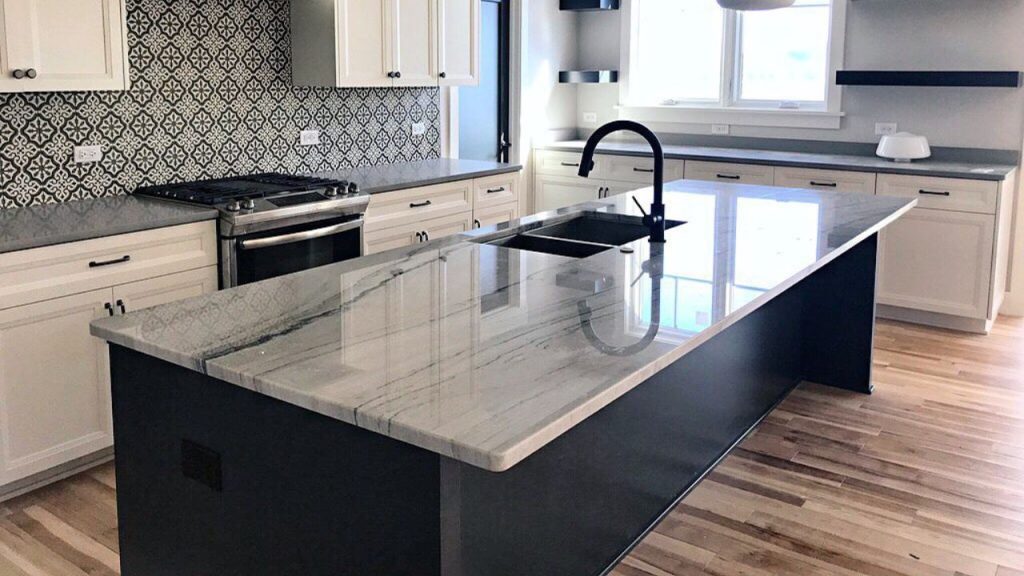
Impressive Durability
Quartzite countertops are well-known for their durability. As a natural stone, quartzite is one of the hardest materials for your kitchen countertop.
It is resistant to scratches and can withstand daily wear and tear, making it an ideal choice for a low-maintenance countertop that will last for years.
Heat Resistance
Another great quality of quartzite is its heat resistance. This natural stone is highly heat resistant, so you can place hot pots and pans directly onto the surface without worrying about damaging it.
This feature adds convenience to your kitchen routine and makes it easier to move around without trivets or potholders.
Stain Resistance
Quartzite countertops are non-porous, which means they do not absorb liquids easily. This feature makes them resistant to stains and easy to clean.
Although sealing is still recommended to enhance its stain resistance, it requires less frequent sealing compared to other natural stones like marble and granite.
With quartzite countertops, you don’t have to stress about spills or splatters ruining the look of your kitchen.
Versatile Design Options
Not only does quartzite offer outstanding durability and resistance to heat and stains, but it also comes in a variety of colors and designs.
Known for its elegant appearance, quartzite often resembles marble, with unique swirling grey and white patterns.
This allows you to achieve the luxurious look of marble at a more affordable price. The versatility of quartzite’s design options makes it easy to match your countertops with your kitchen’s style.
3. Cons of Quartzite Countertops
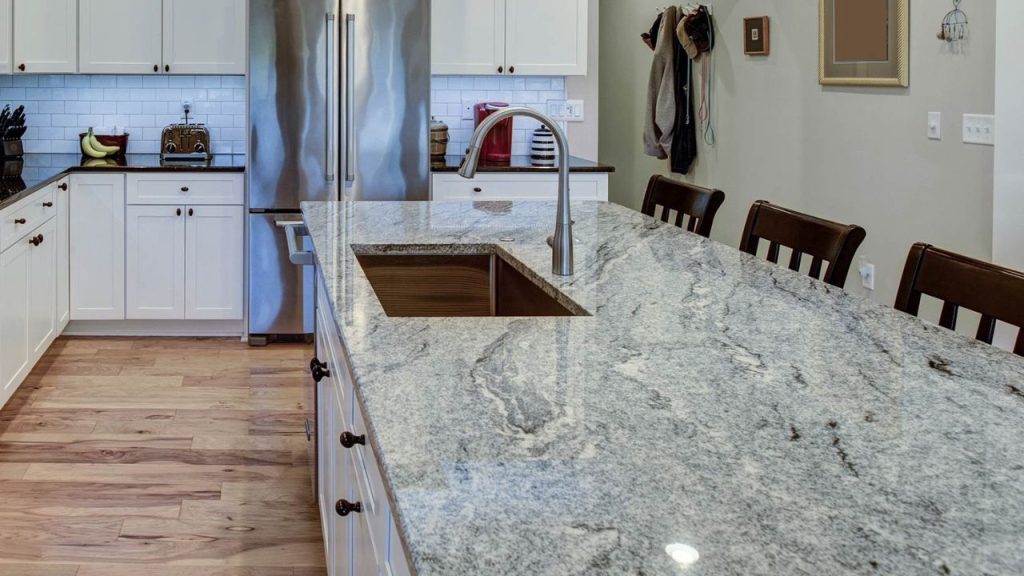
Installation Challenges
Quartzite countertops can be more difficult to install than some other countertop materials. Due to its weight and density, this natural stone may require professional installation.
Additionally, you may encounter challenges when trying to achieve a seamless finish, as matching the unique patterns of quartzite can be difficult.
Maintenance Requirements
Although quartzite is a strong and durable material, it needs regular maintenance to keep its beauty intact. It is a naturally porous material, so it should be sealed periodically to prevent staining and keep it pristine.
Make sure to reseal your quartzite countertops every couple of years or as the manufacturer recommends to maintain their appearance.
It’s essential to use the appropriate cleaning products, as harsh chemicals and abrasives can damage the surface of your quartzite countertops.
Cost Implication
Cost can be a significant factor when considering quartzite for your kitchen countertops. It is generally more expensive than other materials like granite or engineered stone.
The price can vary depending on the quality of the stone, the thickness, and the complexity of the installation.
Additionally, since these countertops are not easy to install, you may have to hire professionals, which can add to the overall cost.
READ MORE:
- Laminate Countertops Pros And Cons
- Marble Countertops Pros And Cons
- Stainless Steel Countertops Pros And Cons
4. Quartzite Countertops Buying Guide
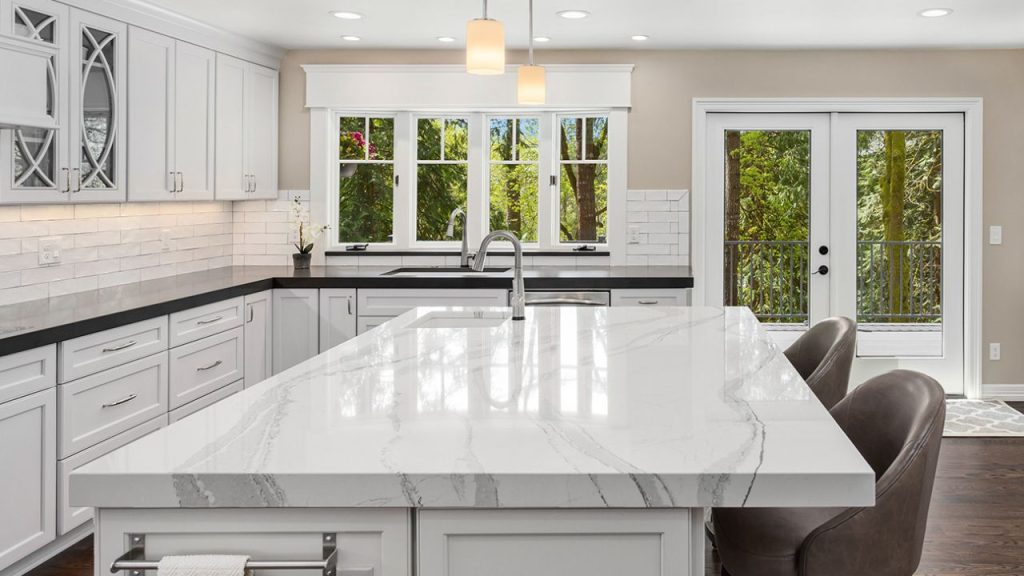
Quality and Budgeting
When considering quartzite countertops, balancing quality and your budget is essential. Quartzite countertops can cost between $60 and $120 per square foot, with a variety of factors influencing the price.
As you explore your options, pay attention to the quality of the materials and any added features or finishes that may increase the cost.
Remember to account for installation costs, which vary depending on your location and installer.
Color and Aesthetic Choices
When it comes to color and aesthetic choices, quartzite offers a wide range of patterns and pigments influenced by how the stone was formed.
However, the color choices can be limited compared to other materials like quartz. While quartzite is known for its beautiful natural patterns, it may not have as many bold color options as man-made quartz.
To find a quartzite countertop that matches your interior design, take the time to explore the different colors and patterns available, and don’t be afraid to mix and match other elements of your design.
Available Manufacturers
Several manufacturers offer high-quality quartzite countertops. Some well-known names in the industry include MSI, Caesarstone, and Cambria.
When selecting a manufacturer, it’s essential to consider the reputation for quality and service. You can often find reviews from other customers online, so research and ask for recommendations if possible.
Additionally, visit showrooms or request samples to see and feel the materials in person, as this can help make your choice more informed and confident.
By following this friendly buying guide, you can find the perfect quartzite countertop to match your aesthetic preferences and budget while supporting a reputable manufacturer.
5. Maintaining Quartzite Countertops
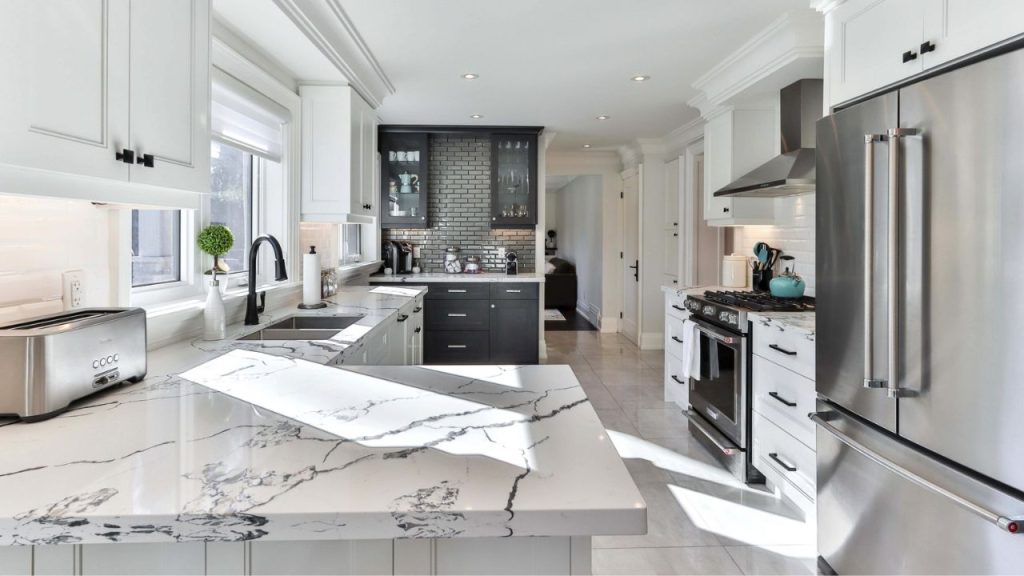
Quartzite countertops are popular in home improvement projects due to their durability and natural beauty. Keeping them looking their best only requires a bit of care and attention.
To maintain the shine and longevity of your quartzite countertops, clean up spills as soon as possible. Wipe up any liquids with warm water and a gentle cleanser using a soft cloth or paper towel.
This will help prevent staining and etching, as the surface’s hardness protects it from most scratches and damage.
Scratching can still happen, so be mindful of using sharp objects or sliding glass items on your countertops.
Always use a cutting board when chopping food, and consider placing felt pads under decorative items to avoid accidental scratching.
Regarding heat resistance, quartzite can generally tolerate exposure to hot pans and pots; however, it’s best to exercise caution.
Use a trivet or heat pad when placing hot cookware directly on the surface to prevent possible damage.
Sealing your quartzite countertops periodically is a great way to protect them from staining and etching.
Consult with a professional to determine the best sealer and frequency based on your home’s specific type of quartzite.
Frequently Asked Questions
How do quartzite countertops compare to marble?
Quartzite is often compared to marble due to their similar appearance. However, quartzite is a natural stone that’s more durable and less porous than marble, making it less prone to staining and etching. It requires less maintenance than marble and is resistant to heat and scratches so you can rely on its long-lasting beauty for your countertops.
What is the best way to clean and seal quartzite countertops?
To clean quartzite countertops, use a soft cloth and mild soap or non-abrasive cleaner with warm water. To keep the stone looking its best, avoid using harsh chemicals, acids, or abrasive scrubbers that can damage its finish. For sealing, it is recommended to use a high-quality penetrating sealer designed for natural stone surfaces. While quartzite is less porous than marble, sealing it every 1-2 years will help prevent stains and keep it in good condition.
Are quartzite countertops heat-resistant?
Quartzite countertops are highly heat resistant due to their natural stone composition. They can withstand high temperatures and handle hot pots and pans without damage or discoloration. However, always exercise caution when placing hot items directly on your countertop, and use trivets or protective pads to ensure their longevity.
Do quartzite countertops scratch or crack easily?
Quartzite is very durable and scratch-resistant, making it less vulnerable to scratches compared to softer stones like marble. However, it’s still a natural stone, and chips or cracks can occur with enough force or impact. Always use a cutting board to avoid damaging your countertop and avoid dropping heavy objects on the surface.
How much do quartzite countertops cost?
The cost of quartzite countertops can vary depending on various factors, including the specific type, finish, and installation. Generally, quartzite countertops can cost between $60 and $120 per square foot. This price is typically higher than granite or quartz countertops but still more affordable than high-end marble options.
Where can I find quartzite countertops near me?
To find quartzite countertops near you, search online for natural stone suppliers or kitchen and bath showrooms in your area. These suppliers often offer a wide variety of stone materials, and they can provide knowledgeable advice on the best options for your project. Alternatively, you can consult a local contractor or interior designer who can recommend reputable suppliers based on their experience.
